- Home
- John le Carré
The Tailor of Panama Page 4
The Tailor of Panama Read online
Page 4
Ten-ounce summerweight, Pendel noted. Terylene mix, too hot for Panama by half. No wonder he wants a couple of suits in a hurry. Thirty-eight waist if a day. The brolly opened. Some don’t. This one shot up like a flag of instant surrender, to descend at the same pace over the upper part of the body. Then he vanished, which was what every customer did between the car park and the front door. He’s coming up the steps, thought Pendel contentedly. And heard his footsteps above the torrent. Here he is, he’s standing in the porch, I can see his shadow. Come on, silly, it’s not locked. But Pendel remained seated. He had taught himself to do that. Otherwise he’d be opening and closing doors all day. Patches of sodden brown gabardine, like shards in a kaleidoscope, were appearing in the transparent half-halo of letters blazoned on the frosted glass: PENDEL & BRAITHWAITE, Panama and Savile Row since 1932. Another moment and the whole bulky apparition, crabwise and brolly-first, lurched into the shop.
“Mr. Osnard, I presume”—from the depths of his porter’s chair—“come in, sir. I’m Harry Pendel. Sorry about our rain. Have a cup of tea or something a little stronger.”
Appetites, was his first thought. A quick brown fox’s eyes. Slow body, big limbs, one of your lazy athletes. Allow plenty of spare cloth for expansion. And after that he remembered a bit of music hall banter that Uncle Benny never tired of, to the insincere outrage of Auntie Ruth:
“Big hands, ladies, big feet, and you all know what that means—big gloves and big socks.”
Gentlemen entering P & B were presented with a choice. They could sit down, which was what the cosy ones did, accept a bowl of Marta’s soup or a glass of whatever, trade gossip and let the place work its balm on them before the drift to the fitting room upstairs, which took them casually past a seductive display of pattern books strewn over an applewood side table. Or they could make a beeline for the fitting room, which is what the fidgety ones did, mostly the new accounts, barking orders to their drivers through the wood partition and making phone calls on their cellulars to mistresses and stockbrokers and generally setting out to impress with their importance. Till with time the fidgety ones became the cosy ones and were in turn replaced by brash new accounts. Pendel waited to see which of these categories Osnard would conform with. Answer: neither.
Nor did he betray any of the known symptoms of a man about to spend five thousand dollars on his appearance. He wasn’t nervous, he wasn’t cast down by insecurity or hesitation, he wasn’t brash or garrulous or overfamiliar. He wasn’t guilty, but then guilt in Panama is rare. Even if you bring some with you when you come, it runs out pretty fast. He was disturbingly composed.
And what he did was, he propped himself on his dripping umbrella, with one foot forward and the other parked squarely on the doormat, which explained why the bell was still ringing in the rear corridor. But Osnard didn’t hear the bell. Or he heard it and was impervious to embarrassment. Because while it went on ringing he peered round him with a sunny expression on his face. Smiling in a recognising kind of way as if he had stumbled on a long-lost friend.
The curved mahogany staircase leading to the gents’ boutique on the upper gallery: my goodness me, the dear old staircase . . . The foulards, dressing gowns, monogrammed house slippers: yes, yes, I remember you well . . . The library steps artfully converted to a tie rack: who’d have thought that’s what they’d do with it? The wooden punkahs swinging lazily from the moulded ceiling, the bolts of cloth, the counter with its turn-of-the-century shears and brass rule set along one edge: old chums, every one . . . And finally the scuffed leather porter’s chair, authenticated by local legend as Braithwaite’s very own. And Pendel himself sitting in it, beaming with benign authority upon his new account.
And Osnard looking back at him—a searching, unabashed upand-down look, beginning with Pendel’s face, then descending by way of his fly-fronted waistcoat to his dark-blue trousers, silk socks and black town shoes by Ducker’s of Oxford, sizes six to ten available from stock upstairs. Then up again, taking all the time in the world for a second scrutiny of the face before darting away to the recesses of the shop. And the doorbell ringing on and on because of his thick hind leg planted on Pendel’s coconut doormat.
“Marvellous,” he declared. “Perfectly marvellous. Don’t alter it by a brush stroke.”
“Take a seat, sir,” Pendel urged hospitably. “Make yourself at home, Mr. Osnard. Everyone’s at home here, or we hope they are. We get more people dropping in for a chat than what we do for suits. There’s an umbrella stand beside you. Pop it in there.”
But far from popping his brolly anywhere, Osnard was pointing it like a wand at a framed photograph that hung centre stage on the back wall, showing a Socratic, bespectacled gentleman in rounded collars and black jacket, frowning on a younger world.
“And that’s him, is it?”
“What’s who, sir? Where?”
“Over there. The Great One. Arthur Braithwaite.”
“It is indeed, sir. You have a sharp eye, if I may say so. The Great One himself, as you rightly describe him. Pictured in his prime, at the request of his highly admiring employees, and presented to him on the occasion of his sixtieth.”
Osnard leapt forward to have a closer look, and the bell at last stopped ringing. “ ‘Arthur G.,’ ” he read aloud from the brass plate mounted on the base of the frame. “ ‘1908–1981. Founder.’ Well, I’m damned. Wouldn’t have recognised him. Hell did the G stand for?”
“George,” said Pendel, wondering why Osnard thought he should have recognised him in the first place but not going so far as to enquire.
“Where d’he come from?”
“Pinner,” said Pendel.
“I meant the picture. Did you bring it with you? Where was it?” Pendel allowed himself a sad smile and a sigh.
“A gift from his dear widow, Mr. Osnard, shortly before she followed him. A beautiful thought that she could ill afford, considering the cost of shipping all the way from England, but she would do it, irregardless. ‘It’s where he’d like to be,’ she said, and nobody could talk her out of it. Not that they wanted to. Not if she’d set her heart on it. Who would?”
“What was her name?”
“Doris.”
“Any kids?”
“I’m sorry, sir?”
“Mrs. Braithwaite. Did she have children? Heirs. Descendants.”
“No, alas, their union was not blessed.”
“Still, you’d think it would be Braithwaite & Pendel, wouldn’t you? Old Braithwaite, senior partner after all. Ought to be first, even if he’s dead.”
Pendel was already shaking his head. “No, sir. Not so. It was Arthur Braithwaite’s express wish at the time. ‘Harry, my son, it’s youth before age. From now on we’re P & B, and that way we won’t be mistaken for a certain oil company.’ ”
“So who are these royals you’ve been dressing? ‘Tailors to Royalty.’ Saw it on your sign. Busting to ask.”
Pendel allowed his smile to cool a little.
“Well, sir, I’ll put it this way, and I’m afraid that’s as far as I’m allowed to go, owing to laze majesty. Certain gentlemen not a great distance from a certain royal throne have seen fit to honour us in the past, and up to the present day. Alas, we are not at liberty to divulge further details.”
“Why not?”
“Partly by reason of the Guild of Tailors’ code of conduct, which guarantees every customer his confidentiality, be he high or low. And partly I’m afraid these days for reasons of security.”
“Throne of England?”
“There you press me too hard, Mr. Osnard.”
“Hell’s the crest o’ the Prince of Wales hanging outside for, then? Thought you were a pub for a moment.”
“Thank you, Mr. Osnard. You have noticed what few have noticed here in Panama, but further than that my lips are sealed. Sit yourself down, sir. Marta’s sandwiches are cucumber, if you’re interested. I don’t know whether her renown has reached you. And there’s a very nice light white I can r
ecommend. Chilean, which one of my customers imports and has the grace to send me a case of now and then. What can I tempt you with?”
For by now it was becoming important to Pendel that Osnard should be tempted.
Osnard had not sat down but he had accepted a sandwich. Which is to say he had helped himself to three from the plate, one to keep him going and two to balance in the ample cushions of his left palm while he stood shoulder-to-shoulder with Pendel at the applewood table.
“Now these aren’t us at all, sir,” Pendel confided, dismissing at one gesture a swatch of lightweight tweeds, which was what he always did. “Can’t be doing with these either—not for what I call the mature figure—all right for your beardless boy or your beanstalk, but not for the likes of a you or a me, I’ll put it that way.” Another flip. “Now we’re getting somewhere.”
“Prime alpaca.”
“It is indeed, sir,” said Pendel, much surprised. “From the Andean highlands of south Peru, appreciated for its soft touch and variety of natural shades, to quote Wool Record, if I may make so bold. Well, I’m blessed, you are a dark horse, Mr. Osnard.”
But he only said this because your average customer didn’t know the first thing about cloth.
“My dad’s favourite. Swore by it. Used to. Alpaca or bust.” “Used to, sir? Oh dear.”
“Dead. Up there with Braithwaite.”
“Well, all I can say is, Mr. Osnard, with no disrespect intended, your esteemed father knew whereof he spoke,” Pendel exclaimed, launching upon a favourite subject. “Because alpaca cloth is in my fairly informed judgment the finest lightweight in the world bar none. Ever was and ever shall be, if you’ll pardon me. You can have all your mohair-and-worsted mixes in the world, I don’t care. Alpaca is dyed in the thread, hence your variety of colour, hence your richness. Alpaca is pure, it’s resilient, it breathes. Your most sensitive skin is not bothered by it.” He laid a confiding finger on Osnard’s upper arm. “And what did our Savile Row tailor use it for, Mr. Osnard, to his eternal and everlasting shame until the scarcity prevented him, I wonder?”
“Try me.”
“Linings,” Pendel declared with disgust. “Common linings. Vandalism, that’s what it is.”
“Old Braithwaite would have boiled over.”
“He did, sir, and I’m not ashamed to quote him. ‘Harry,’ he said to me—it took him nine years to call me Harry—‘Harry, what they’re doing to the alpaca, I wouldn’t do to a dog.’ His words, and I can hear them to this day.”
“Me too.”
“I beg your pardon, sir?”
If Pendel was all alertness, Osnard was the reverse. He seemed unaware of the impact of his words and was studiously turning over samples.
“I don’t think I quite got your meaning there, Mr. Osnard.”
“Old Braithwaite dressed m’dad. Long ago, mind. I was just a nipper.”
Pendel appeared too moved to speak. A rigidity came over him and his shoulders lifted in the manner of an old soldier at the Cenotaph. His words, when he found them, lacked breath. “Well I never, sir. Excuse me. This is a turn-up for the book.” He rallied a little. “It’s a first, I don’t mind admitting. Father to son. The two generations both, here at P & B. We’ve not had that, not in Panama. Not yet. Not since we left the Row.”
“Thought you’d be surprised.”
For a moment Pendel could have sworn the quick brown fox’s eyes had lost their twinkle and become circular and smoky dark, with only a splinter of light glowing in the centre of each pupil. And in his later imagination the splinter was not gold but red. But the twinkle was quickly there again.
“Something wrong?” Osnard enquired.
“I think I was marvelling, Mr. Osnard. ‘A defining moment’ I believe is the expression these days. I must have been having one.” “Great wheel o’ time, eh?”
“Indeed, sir. The one that spins and grinds and tramples all before it, they say,” Pendel agreed, and turned back to the samples book like one who seeks consolation in labour.
But Osnard had first to eat another cucumber sandwich, which he did in one swallow, then brushed the crumbs off his palms by bringing them together in a slow slapping movement several times until he was satisfied.
There was a well-oiled procedure at P & B for the reception of new customers. Select cloth from samples book, admire same cloth in the piece—since Pendel was careful never to display a sample unless he had the cloth in stock—repair to fitting room for measurement, inspect Gentlemen’s Boutique and Sportsman’s Corner, tour rear corridor, say hullo to Marta, open account, pay deposit unless otherwise agreed, come back in ten days for first fitting. For Osnard, however, Pendel decided on a variation. From the samples desk he marched him to the rear corridor, somewhat to the consternation of Marta, who had retreated to the kitchen and was deep in a book called Ecology on Loan, being a history of the wholesale decimation of the jungles of South America with the hearty encouragement of the World Bank.
“Meet the real brains of P & B, Mr. Osnard, though she’ll kill me for saying it. Marta, shake hands with Mr. Osnard. O-S-N, then A-R-D. Make a card for him, dear, and mark it ‘old customer,’ because Mr. Braithwaite made for his father. And the first name, sir?”
“Andrew,” said Osnard, and Pendel saw Marta’s eyes lift to him, and study him, as if she had heard something other than his name, then turn to Pendel in enquiry.
“Andrew?” she repeated.
Pendel hastened to explain: “Temporarily of the El Panama Hotel, Marta, but shortly to be moving, courtesy of our fabled Panamanian builders, to—?”
“Punta Paitilla.”
“Of course,” said Pendel with a pious smile, as if Osnard had ordered caviar.
And Marta, having very deliberately marked the place in her tome and pushed the tome aside, grimly noted these particulars from within the walls of her black hair.
“Hell happened to that woman?” Osnard demanded in a low voice as soon as they were safely back in the corridor.
“An accident, I’m afraid, sir. And some rather summary medical attention after it.”
“Surprised you keep her on. Must give your customers the willies.”
“Quite the reverse, I’m pleased to say, sir,” Pendel replied stoutly. “Marta is by way of being a favourite among my customers. And her sandwiches are to die for, as they say.”
After which, to head off further questioning about Marta, and expunge her disapproval, Pendel launched himself immediately upon his standard lecture on the tagua nut, grown in the rain forest and now, he assured Osnard earnestly, recognised throughout the feeling world as an acceptable substitute for ivory.
“My question being, Mr. Osnard, what are the current uses of your tagua today?” he demanded with even more than his customary vigour. “Ornamental chess sets? I’ll give you chess sets. Carved artefacts? Right again. Our earrings, our costume jewellery, we’re getting warm—but what else? What possible other use is there which is traditional, which is totally forgotten in our modern age, and which we here at P & B have at some cost to ourselves revived for the benefit of our valued clients and the posterity of future generations?”
“Buttons,” Osnard suggested.
“Answer, of course, our buttons. Thank you,” said Pendel, drawing to a halt before another door. “Indian ladies,” he warned, dropping his voice. “Cunas. Very sensitive, if you don’t mind.”
He knocked, opened the door, stepped reverently inside and beckoned his guest to follow. Three Indian women of indeterminate age sat stitching jackets under the beam of angled lamps.
“Meet our finishing hands, Mr. Osnard,” he murmured, as if fearful of disturbing their concentration.
But the women did not seem half as sensitive as Pendel was, for they at once looked up cheerfully from their work and gave Osnard broad, appraising grins.
“Our buttonhole to our tailor-made suit, Mr. Osnard, is as our ruby to our turban, sir,” Pendel pronounced, still at a murmur. “It’s where the eye fa
lls, it’s the detail that speaks for the whole. A good buttonhole doesn’t make a good suit. But a bad buttonhole makes a bad suit.”
“To quote dear old Arthur Braithwaite,” Osnard suggested, copying Pendel’s low tone.
“Indeed, sir, yes. And your tagua button, which prior to the regrettable invention of plastic was in wide use across the continents of America and Europe and never bettered in my opinion, is, thanks to P & B, back in service as the crowning glory of our fully tailored suit.”
“That Braithwaite’s idea too?”
“The concept was Braithwaite’s, Mr. Osnard,” said Pendel, passing the closed door of the Chinese jacket makers and deciding for no reason except panic to leave them undisturbed. “The putting it into effect, there I claim the credit.”
But while Pendel was at pains to keep the movement going, Osnard evidently preferred a slower pace, for he had leaned a bulky arm against the wall, blocking Pendel’s progress.
“Heard you dressed Noriega in his day. True?”
Pendel hesitated, and his gaze slipped instinctively down the corridor towards the door to Marta’s kitchen.
“What if I did?” he said. And for a moment his face stiffened with mistrust, and his voice became sullen and toneless. “What was I supposed to do? Put up the shutters? Go home?”
“What did you make for him?”
“The General was never what I call a natural suit-wearer, Mr. Osnard. Uniforms, he could fritter away whole days pondering his variations. Boots and caps the same. But resist it how he would, there were times when he couldn’t escape a suit.”
He turned, trying to will Osnard into continuing their progress down the corridor. But Osnard did not remove his arm.

 The Honorable Schoolboy
The Honorable Schoolboy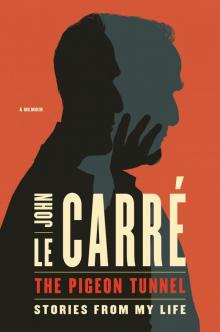 The Pigeon Tunnel: Stories From My Life
The Pigeon Tunnel: Stories From My Life Single & Single
Single & Single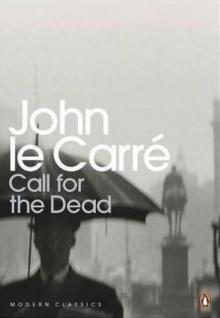 The Spy Who Came in From the Cold
The Spy Who Came in From the Cold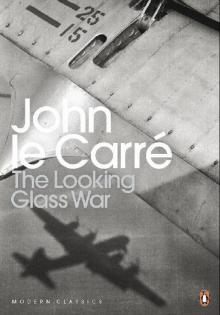 The Looking Glass War
The Looking Glass War The Night Manager
The Night Manager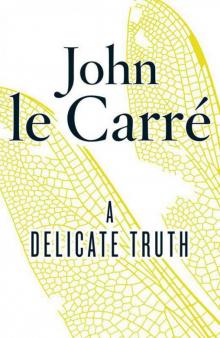 A Delicate Truth
A Delicate Truth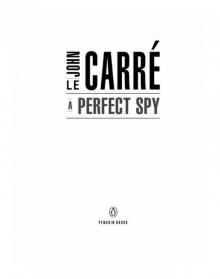 A Perfect Spy
A Perfect Spy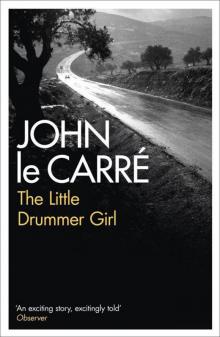 The Little Drummer Girl
The Little Drummer Girl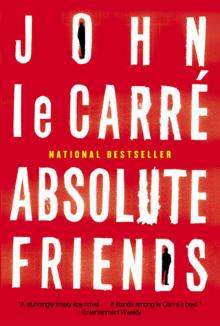 Absolute Friends
Absolute Friends A Murder of Quality AND Call for the Dead
A Murder of Quality AND Call for the Dead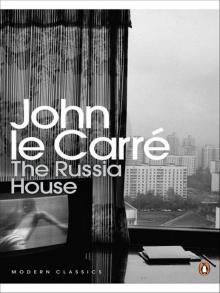 The Russia House
The Russia House The Tailor of Panama
The Tailor of Panama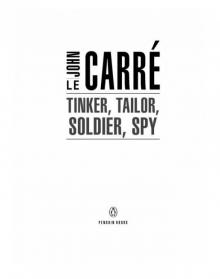 Tinker, Tailor, Soldier, Spy
Tinker, Tailor, Soldier, Spy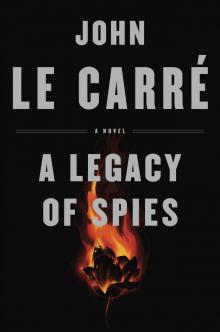 A Legacy of Spies
A Legacy of Spies The Mission Song
The Mission Song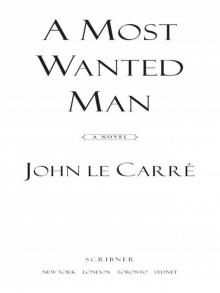 A Most Wanted Man
A Most Wanted Man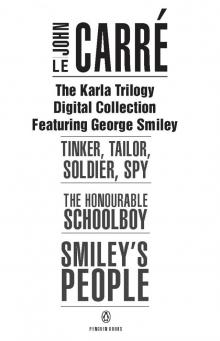 John Le Carré: Three Complete Novels
John Le Carré: Three Complete Novels The Secret Pilgrim
The Secret Pilgrim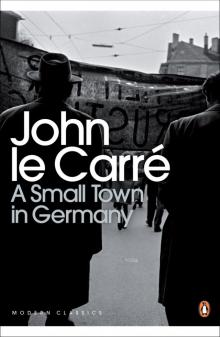 A Small Town in Germany
A Small Town in Germany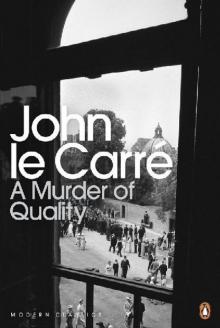 A Murder of Quality
A Murder of Quality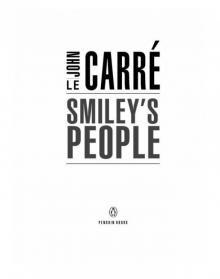 Smiley's People
Smiley's People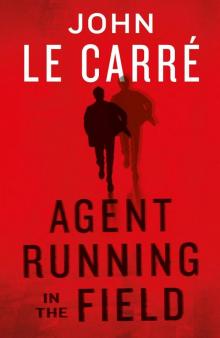 Agent Running in the Field
Agent Running in the Field The Spy Who Came in from the Cold s-3
The Spy Who Came in from the Cold s-3 The Pigeon Tunnel
The Pigeon Tunnel The Russia House - 13
The Russia House - 13 The Honourable Schoolboy
The Honourable Schoolboy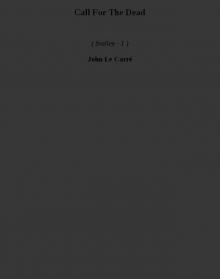 Call For The Dead s-1
Call For The Dead s-1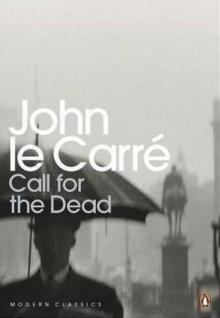 Call for the Dead
Call for the Dead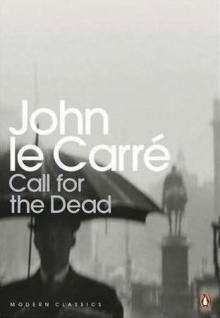 Call for the Dead - 1
Call for the Dead - 1